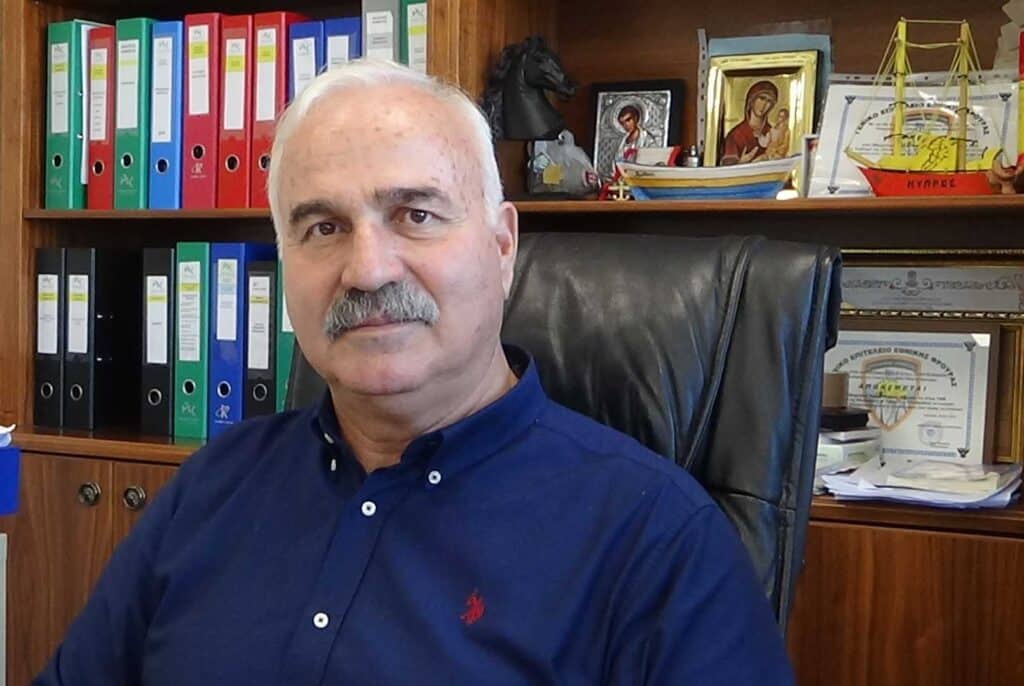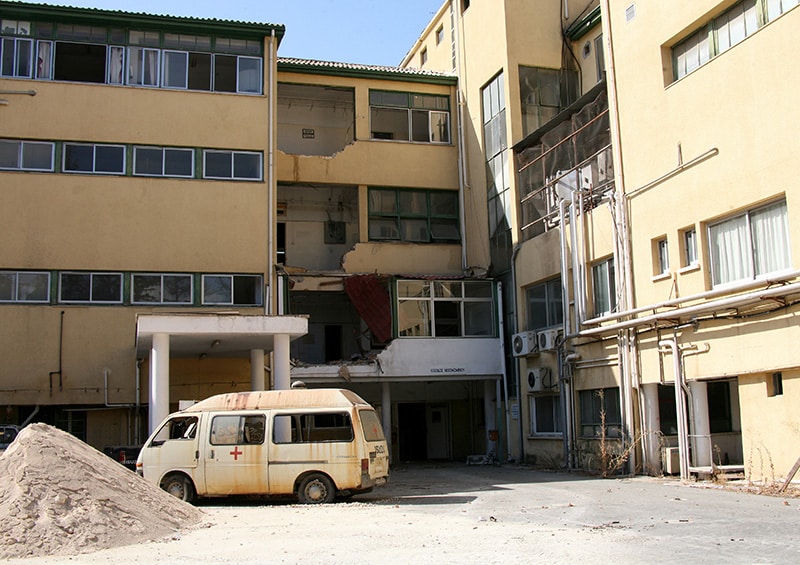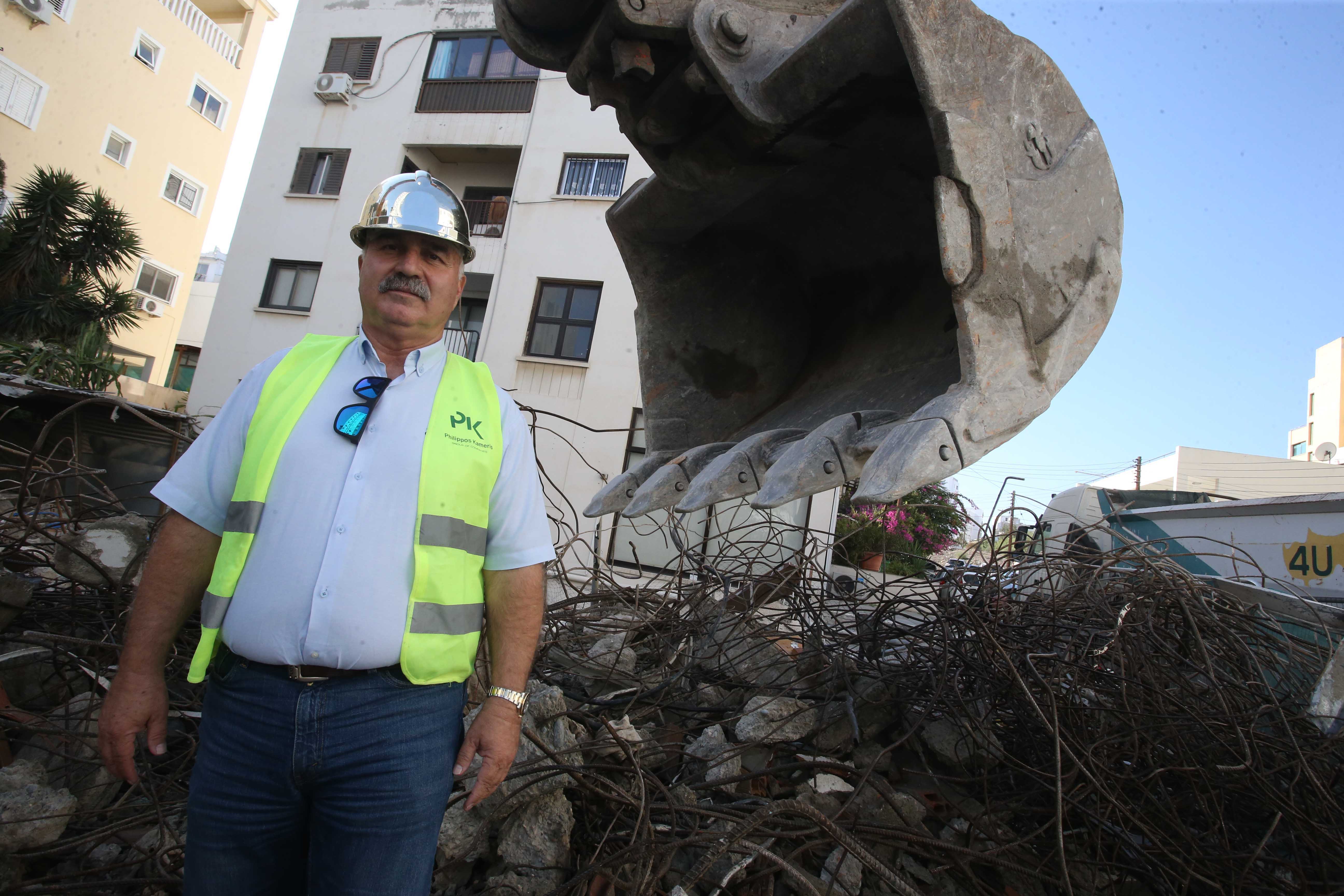THEO PANAYIDES meets a family man who has built his business up from owning just one truck. Just doing his job in the never-ending urban sprawl, recycling as much as possible
Philippos Kameris holds a special place on the – relatively short – list of people who’ve caused me pain without meaning to, and without even knowing me. It often happens, on my walks around Nicosia, that I pass a house I’ve known for years, as familiar as an old friend – sometimes an old house with red tiles and sandstone walls, now increasingly one of those 60s or 70s houses with coloured shutters and bits of brickwork – only to find that the house is gone, replaced by a pile of rubble or an empty lot. I have no investment in this house, of course (I never even know who it belongs to), yet the shock of its disappearance always creates a sense of loss, especially knowing that it’s almost certainly going to give way to a much uglier apartment block – and there, invariably, is a sign for the Philippos Kameris Group, a member of the EDA (European Demolition Association) and the top company in Cyprus if you need a house knocked down.
It’s not just knocking down houses; the firm also handle renovations, and indeed also build things – including the office block, somewhere in Strovolos, with Zorbas on the ground floor and their offices on the first – though demolitions are the bulk of their work. The reception area is adorned with yellow toy bulldozers (the tools of the trade), plus a number of diplomas and certificates; many of them, significantly, are environmental awards. “Our concern, always – in fact it’s our slogan – is for the environment,” Philippos tells me later. He himself is a burly 61-year-old with white hair, a salt-and-pepper moustache and a direct, quietly confident manner. I’d expected to do a whole spiel when calling to request an interview – I’d prepared myself to explain, truthfully, that I’ve never met anyone in the demolition business before – but he just agrees without hesitation, like he fields requests for profiles on a weekly basis. He shakes hands firmly on arrival, leads me to his office, and calls for coffee; the good one, he instructs the secretary behind the desk, “the one I brought from Kavala”.

He’s been successful, no doubt about it. “We’re No. 1 in Cyprus,” he affirms – though most of their business is in Nicosia and they’ve only done a handful of jobs in Paphos, for instance (I presume local contractors always have the edge). “We’re the only ones who’ve done – and I’ll give you examples – difficult jobs, 10-storey blocks and so on, without a stone out of place. In central locations.” Hotels and apartment blocks come with a special degree of difficulty, since explosives can’t be used for demolitions in Cyprus. “We use our own methodology. From the top down.”
Philippos lists a few of their bigger projects over the decades, each name lighting a half-forgotten image in my mind. The Athineon cinema near the old GSP stadium, knocked down over 20 years ago. The army camp opposite the Hilton (now Landmark). The Excelsior Hotel, “right on the pavement”, on the site of what’s now the Labs Tower. A seven-storey building – once a Laiki bank – on Makariou in Limassol. Another ex-Laiki in Nicosia, also on Makariou opposite Marks & Spencer, which was never going to be completely demolished (the idea was to keep the ground floor and mezzanine, then erect a 16-storey hotel on top) – but the project got paused during Covid and the building still stands, with its nine floors gutted. “In Larnaca we demolished the Kition Hotel, right on the traffic lights, people hardly even realised we’d demolished it. Six floors. Another seven-floor one, next to the police station and in front of social security… Here [in Nicosia] near Pasydy, where Parliament was going to be built, two 10-storey blocks. We demolished the old GSP, the whole of town planning, migration. Everything around the interior ministry, we demolished it all.” They knocked down the old Nicosia hospital, despite the protests of neighbours who were worried about dangerous chemicals escaping. The first stage, in 2006, also involved transporting equipment from the old site to the new. “10 days to move it all. We did that too.”
The process varies – but some things are constant. “Whatever we demolish, we follow all the recycling laws. We start by removing everything that can be sold later.” The usual deal involves granting Kameris the right to remove and resell fixtures – gates, doors, windows, tiles – in exchange for a lower price; even sandstone gets stored for re-use, having become hard to find in Cyprus (some import from the occupied north; but he doesn’t approve of that). Once the building has been stripped down to steel, bricks and concrete, the bulldozers – or usually excavators – come in, then everything gets sent off for recycling; sometimes, with big projects, a crusher is brought and the bricks and concrete are crushed into gravel instead, to be used in the same project. Above all, says Philippos, safety is key; they always have a health and safety plan, and follow it religiously. They’ve never had an accident (touch wood), but less scrupulous operators can’t say the same. “They called me up to do a job in old Nicosia,” he recalls sombrely. “I named my price. ‘No way, koumbare, I’ll do it myself’. Got a foreigner to do it with a mini-digger, a wall caved in on him and killed him.”

His company was responsible for the destruction of the old Nicosia hospital
Philippos Kameris is proud of his company, and says so repeatedly; he’s a small businessman – they have about 30 employees – who’s done well for himself, and worked hard to do it. His hours are harsh, even now; 12 hours a day, 6am to 6pm, arriving early to co-ordinate the crews before they head off. (So he wakes up at five? “All my life! All my life, ever since I was at school.”) It’s not just the actual demolition, they do everything; he has three engineers just to deal with the paperwork. “While you’re drinking your coffee we’ll get you a demolition permit, we’ll arrange to have the power cut, put up fencing, security… Then we’ll bring you the final approval, from the relevant municipality, that your house has been demolished and you’re able to build on the land.” Above all, he says, they have values, which are also his family’s values: “Always do the right thing,” he proclaims. “Never lie. Work selflessly. And respect every customer, and people in general. ‘Treat others as you’d like to be treated yourself’. That was our family slogan.”
All well and good – but isn’t there something slightly odd about a profession where you’re always destroying things? Does he never feel sorry for the homes he demolishes, especially when they’re old and beautiful? I know what you mean, he admits: “There are times when the owners want to come and watch their house being knocked down, for instance. ‘I want to look’ – and they cry, and carry on. We do get such cases. Or there are others, if they live nearby, [who say] ‘Let me get my parents and we’ll go somewhere else, then you can demolish it’. For sentimental reasons… We just do our duty,” he concludes with a shrug. After all, he points out, “if you have a house in the centre, and it’s €2 million for the plot of land, and you have a house that’s uninhabited – well, won’t you take the €2 million, or else develop it if you can?”.
Sure, that makes sense. But still – does he feel nothing?
“Look – we’ve become a bit like doctors, you know? After all these years, all the demolitions I’ve seen… Imagine if I got sad every time I did a demolition!”
Fair enough; yet there’s also a paradox. Philippos grew up in the Nicosia suburb of Acropolis at a time when it was practically semi-rural. He recalls walking to school at the age of six – crossing what’s now a very busy main road – and exploring caves which have long since been sealed. “I remember Nicosia when we used to play in the fields,” he recalls, “and wouldn’t get home until dark, and my mum was waiting outside threatening to lock us out! The whole neighbourhood playing together… But now it’s the generation of mobile phones, and computers and so on.” He’s a middle-aged, old-fashioned man who knows exactly what’s been lost by endless construction and urban sprawl – yet he’s also part of the system (it’s his job, but still) that makes it happen.
“Look,” he sighs when I point out the paradox. “It’s a question of development, and let’s say of globalisation… I don’t feel I’m the guy who’s going to change, or stop, development or globalisation. We have people whose job that is, we have presidents and politicians who deal with these things.” Philippos himself is civic-minded – he served two terms as a municipal councillor in Engomi – but doesn’t claim to be a politician, or anything more than what he is. “We just do our job,” he says simply, “and try to have some quality of life”. He and his wife, a school inspector in the state sector, have a house in the village (his family hail from Dymes, near Kyperounta) and another summer home on a small Greek island, “and we go there regularly. To relax, and get away from all the bad stuff that’s happening”.
Thoughts of retirement loom large in general. Philippos is only 61, but he’s worked all his life – helping his dad with demolitions as a child, working at refugee settlements as a teen after the invasion – and besides his college-educated boys are here to help now. (He himself cut his studies short, coming back to take advantage of the construction boom in the mid-80s.) “My children call it ‘Philippos Project’,” he says with a smile. “How they can lighten my load, so I can step back little by little.” He doesn’t intend to retire completely – but he has an 800cc BMW motorbike languishing in his basement because he never has time to ride it, and he’d also like to buy a boat and travel more. After all, the work never ends – and won’t be ending, at least for the foreseeable future.
Is that true? Can Cyprus continue on its path of rampant development, an ever-changing landscape of hotels and towers, construction and demolition? “It will continue,” he asserts firmly in his stolid, authoritative manner. “It’ll continue. Because word on the street is that we’re going to be two million people very soon. We’re one million now, with the foreigners.” Lebanese and Israelis are streaming in, Russians and Ukrainians never really left; even when the wars subside they’ll still want to live here, “we’re a safe haven”. Philippos Kameris doesn’t make the rules – he just plays the game, trying to be as decent and professional as possible. It’s like when I ask why dynamite is banned for demolitions here, when it’s permitted throughout Europe. “You’d have to ask those who passed the law,” he replies gruffly. “I’m not a legislative authority – I’m a man of the people. I’m the last wheel on the wagon.” At least I’ll feel a little less indignant now, whenever I see his sign beside the rubble of a house I used to know.







Click here to change your cookie preferences